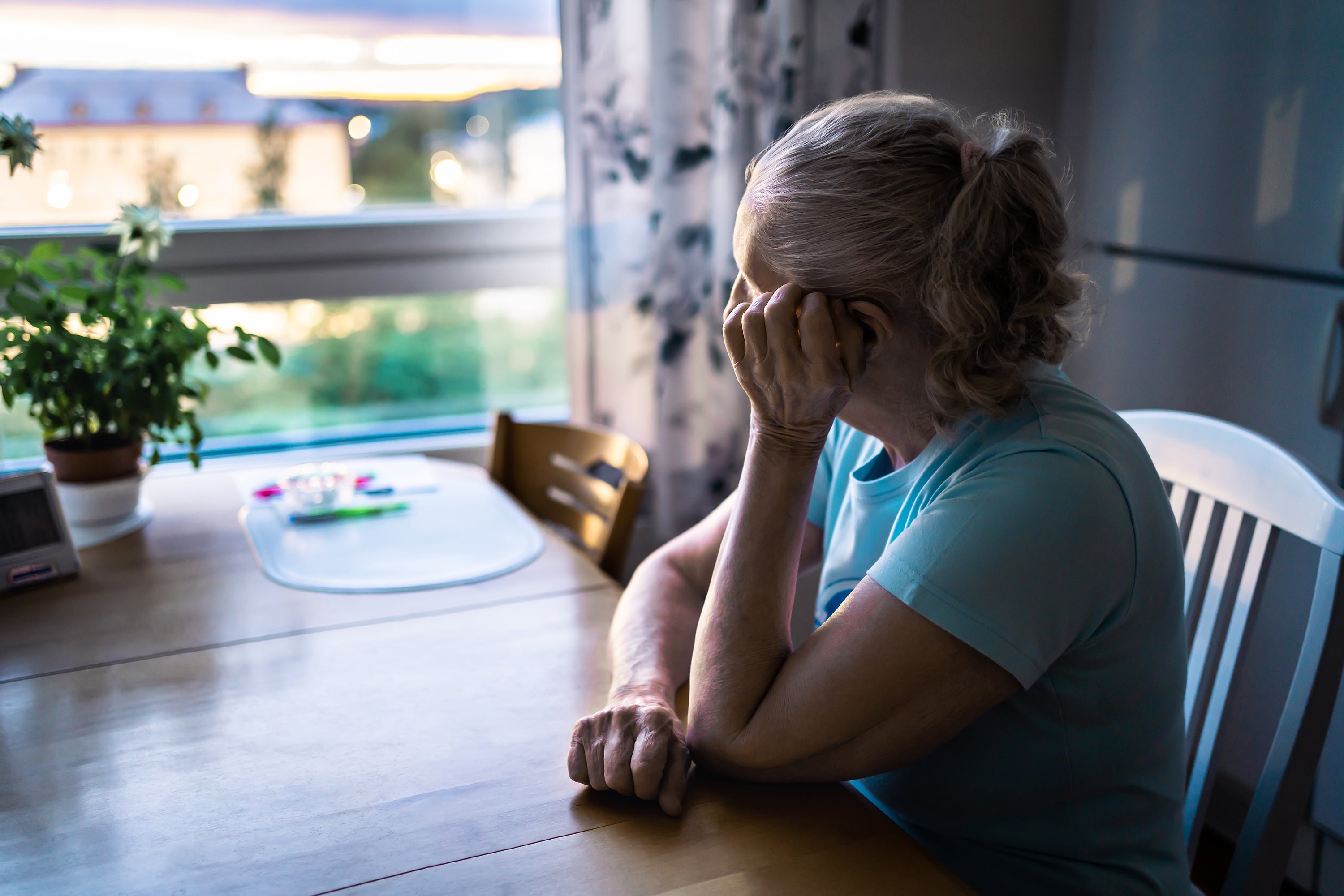The Independent's journalism is supported by our readers. When you purchase through links on our site, we may earn commission.
Where did everyone go? The painful truth about loneliness in middle-age...
British middle-aged men and women are some of the loneliest in the world – something that both Eleanor Mills and Grant Feller found out the hard way. They explain how they overcame it – and how you could, too


It’s a strange thing to find yourself lonely in mid-life. It creeps up slowly as the kids leave home, or friends move away. Lives that were once thronged with people, bursting with activities, days that felt like an endless to-do list that never got completed, give way to a phone that doesn’t ring or ping. In place of the busy-ness come echoing evenings, endless weekends.
A friend who lives on her own and whose children are at university came to visit the other day. With a rather sad laugh, she told me she’d become “the woman who is a bit too keen to chat in the post office”.
I gave her a hug. I realised that because she has moved out of London a few years ago, although we chat on the phone and exchange texts, we hadn’t actually seen each other face to face since before the pandemic. And she’s someone I consider a good friend.
Like many fiftysomethings, she’d separated from her spouse of nearly three decades as her children left for university. And like many of the half a million people over 50 who are now out of work after lockdown, she’d been made redundant from her job during the pandemic.
Almost overnight she’d gone from having colleagues, a husband, children at home and lots of friends – from work, from the schoolgate, from uni – to living in what she described as “solitary grandeur” in the middle of the Cotswolds. “I thought my farmhouse kitchen would be full of my kids and their friends, that my old pals would come to stay and I’d make new mates in the village. But sometimes I feel I am living in the zombie apocalypse. I go for a walk and don’t meet a soul.”
A study from Arizona State University published recently found that middle-aged English people are the loneliest in Europe and are more likely to suffer from the effects of isolation than previous generations. The researchers looked at people aged 45-65 and found that younger boomers (those born between 1955 and 1964) and Generation X-ers (me and everyone else born between 1965 and 1974) reported higher levels of loneliness during their middle age than any other cohorts.
The reasons are complex. Like America (the country that has even higher rates of loneliness than the UK) we tend to move for professional reasons and then end up living further away from our extended families and childhood friends.
Modern life, long working hours and technology exacerbate the problem. I run a community of women in mid-life called noon.org.uk and organise a monthly noon circle for women 45-and-over to meet and converse in real life. So many of those who come say they have become “outcasts from their tribe”. For some, that’s because of a divorce, or an empty nest.
We Brits are great ones for putting on a brave face, but the reality is many people with surface-shiny lives are actually sad and isolated underneath
Many who have always worked now find themselves jobless in their fifties because of gendered ageism, they miss the camaraderie of the office, the banter, the “community of work”.
Many of my Queenagers (as we call mid-life women at Noon) have moved out of the neighbourhood where they have lived for decades as their husbands – often older – retire. “I love it in Cornwall,” said one woman. “I have loads of friends down here, but you can’t make “old friends”. It often feels like I have to be the bright and shiny version of me with new friends. I don’t feel I can drop too much reality or darkness on them and I’ve been having a really tough time since my mother died.”
Mid-life is a time of loss, of pivoting and rebooting because whatever we have been doing for the last three decades or so tends to come to an end at around 50. In research Noon conducted, we found that by 50, more than half of women have been through at least five massive life events – divorce, bereavement, redundancy, caring for elderly parents, or a teen with anxiety or worse, their own health issues.

For many of us, being forced into a sudden mid-life pivot comes as a shock. At 49, I left the job that had defined my identity for 23 years and although I had my kids and my husband, I felt like I had lost my work tribe and a huge part of who I was. For the first time in my life, I felt lonely.
Finding a new gang isn’t just nice to have – our lives may well depend on it. Loneliness has severe health impacts; in a study of 18,509 adults in the UK with type 2 diabetes who were questioned about how lonely they felt and how often they saw friends and family, 61 per cent said they were lonely and rarely had people to talk to.
Those who said they felt lonely were 26 per cent more likely to develop heart disease than those who had fuller social lives. In fact, the study found that loneliness was a bigger risk factor for heart attack or stroke in those with type 2 diabetes than eating a poor diet, not taking exercise, smoking or having depression. That is quite a finding.
We Brits are great ones for putting on a brave face, but the reality is we are living in an epidemic of loneliness and many people with surface-shiny lives are actually sad and isolated underneath.
I have found that, if you are shifting into a new phase, you need new friends to help you become a new version of yourself. I found a new posse who shared my new outlook by going on retreats – being stuck in the middle of nowhere with others also going through big life transitions or who are working on themselves is a great way to make good new friends fast.
As is going on a solo holiday with a group. Or volunteering – whether that’s working in a local charity shop, for The National Trust, or a food bank. Many lifelong friendships fall apart in mid-life; this is a natural process of shedding what no longer serves us (although it is very painful). True friends last forever – but we also need to be on the lookout for friends we haven’t made yet too. Be open-minded, be friendly – ask someone for a coffee, befriend a new colleague.
Part of the trick of mid-life reinvention is doing something new, putting yourself out there, intentionally forging new connections. I know that feels scary but it is also exciting and revivifying. It might just save your life.
Eleanor Mills is the Founder of Noon.org.uk – home of the Queenager, a community for women in mid-life. Her book ‘Much More to Come’ is being published on 31 August by Harper Collins

‘Feeling lonely made me forget how to be a friend’
Grant Feller, 55, corporate consultant
It’s not the loneliness, so much as everything that goes with it. The insecurity, the strange feeling that you’re no longer the person you once were, the sudden and inexplicable inability to have simple conversations with those closest to you. Then comes the fear that you’ve lost skills – social, work, emotional – that you once took for granted and the crippling paranoia that everyone is talking about you.
I suffered and endured all of this and more when I suddenly lost my job at the age of 44. Financially things were tricky for a while, but never perilous. What was much more difficult was the feeling that I had somehow failed, so I withdrew. If I was in someone’s company, I automatically felt that they would judge me. I clammed up at the very moment that I should have been expressing myself. Solitude became comforting.
I’m lucky in that I have an extraordinarily close group of friends and a supportive family, but I didn’t want well-meaning people near me. My daytimes were spent entirely on my own on the arduous task of trying to reinvent myself from a tired middle-aged journalist into a corporate consultant. A decade later, I feel successful enough to look back on those lonely years when I felt very stuck.
I wondered if it was depression, but now realise it was loneliness. I had spent my entire working life with people, talking to them, arguing, listening, engaging. And then, suddenly, nothing. I was just a bloke still in his pyjamas, sending emails to people who probably didn’t read them, with only a cockapoo for company.

When the rest of the family came home from school and work, I had to find the inner strength to put on a show. Not the unemployed dad or husband that I feared had become my identity.
Interactions with friends were far more difficult. I was convinced that either no one would want to spend time with me or, worse, that I had forgotten the social skills that made friendships work in the first place. Feeling lonely made me forget how to be a friend.
The turning point was when a mate, desperate for a goalkeeper to make up his 5-a-side team, handed me a pair of gloves on the off-chance I might be free. Instead of the automatic response of “No, thanks”, I forced myself to say yes. (After all, goalie is the perfect position for an angst-ridden lonely person, as German filmmaker Wim Wenders captures so well in The Goalkeeper’s Fear of the Penalty.) I then said yes to a friend who wanted to go on a cookery course and then to someone else who wanted to start a book club, and then a film club.
“Yes” can sometimes be the hardest word for someone who feels lonely – “no” is such an easy and instinctive response. These were tiny steps that grew into huge strides.
Loneliness was, thankfully, a short phase in my middle age – perhaps a couple of years, but getting through this time gave me huge resilience. Today, I am more effective in my work because of it. Advising people who are at the peak of their careers on how to tell their stories, I realise that the higher they’ve climbed, the lonelier they feel. Middle age does that to you. You start to wonder what’s next, while nervously looking over your shoulder at who is behind you. I’ve learned to do neither and just be happy in the moment. Today’s the day that matters. Just say yes.






Join our commenting forum
Join thought-provoking conversations, follow other Independent readers and see their replies
Comments